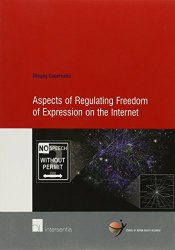$71.00
$71.00
(SAVE Now!)
as of 11/24/2024 (Details)
This research examines the determining criteria for regulation of freedom of expression exercised on the internet, allowing a "fair balance" between that freedom and other competing interests. The book will benefit lawyers and courts which have to deal with an increasing number of cases involving online speech. It will also assist legislators when they consider adopting or amending legislation regulating online speech, potentially preventing the adoption of legislation contrary to Article 10 of the European Convention on Human Rights. Internet service and content providers will be interested in the section dealing with the distribution of liabilities amongst participants to online communication. The book develops methods of analyzing the specific effect the internet may have on freedom of expression and on its regulation, and provides examples of criteria identified through those methods in selected areas such as hate speech, defamation, or adult speech. It identifies general principles of freedom of expression which are less likely to change with time and technology, and considers how they can be transposed to the online reality. For instance, the general principle that minors are to be protected from adult material has found various specific incarnations in rules, such as demanding an identification document in a shop or a cinema or a late-hour broadcast rule for TV and radio, based on the presumption that unaccompanied minors are unlikely to be exposed. Neither of these is readily available on the internet (there is no "late hour" in this always-on medium), and so the principle had to find another expression aimed at age identification, such as the use of credit card numbers. The book analyzes the reasons for the lack of a global comprehensive approach to cyberspeech regulation and concludes that the main obstacle is not grounded in any features of the internet, but rather in the absence of a universal agreement on the substantive rules to regulate online speech. Pending such an agreement, domestic authorities and regional organizations will still deal with the issue, with the methods proposed here being of assistance.
Technical Details
No features available.